- Home
- Matt Hilton
Dead Fall Page 4
Dead Fall Read online
Page 4
“You got me,” I said, and I offered him a smile.
“What you looking so feckin’ pleased about? Another few seconds and you’re going to learn what those other two did: you don’t fuck with Mick O’Neill.”
“You got me,” I repeated. “But I’ve also got you, you murdering piece of shit.”
O’Neill was slow to catch on.
“Did you get everything you needed, Detective?” I said, for effect leaning down so I could speak closer to the hidden microphone taped to my chest. In my ear Bryony VanMeter said, “Enough to put him away for life, Joe.”
Along the hall there was the repeated boom of a ram smashing into a door as the police arrest squad began breaking their way into the fallow space.
“What the hell?” O’Neill shouted angrily. “You’re wired?”
“Yes,” I said, “and the Tampa PD just recorded your full confession.”
“Son of a . . .” O’Neill shook his head in despair. Then his features grew hard again. To his two pals he said, “Throw this fecker out of that window. We might as well be hung for a sheep as a lamb.”
I didn’t bother begging for my life, or try to tell him that it was over, that he was caught. It wasn’t my style. I leaned down, said into the microphone, “Best get in here fast, O’Neill’s so distraught I’m not sure he’s going to hang around to be arrested.”
My words were enough to give the trio around me pause. It was all I required. I whipped my skull backward, cracking the hard crown into the bridge of the nose of the big guy holding me. His hold on me loosened marginally as he reared back, eyes shutting in reaction to the blow. I jerked down with my arms, clenched him to me and kicked out, finding O’Neill’s testicles with the toe of my boot. The third man cried out harshly, bringing up my gun. Everything happened within moments, a confusion of grunts and curses, and the cracking of the gun. Amidst the scuffle I’d twisted forward at the hips, hauling my captor up and onto my back, and it was his face that took the bullet, not mine.
I dropped the dead man, even as his friend stepped back in dismay at killing his buddy. I didn’t halt my momentum, and went at him, scooping aside his gun hand and head-butting him full in the face. The man went down on his back, unconscious, the gun spinning away from his grip.
I let the gun lie.
Instead I grasped the flowing hair of Mick O’Neill, twisted it tightly in my grasp and tore him toward the window.
“No, O’Neill, don’t do it!” I yelled for good effect and then slung the screaming man out of the window. “Holy shit!” I cried. “He jumped. Jesus Christ, he jumped rather than be taken alive.”
The cops would hear my cry, even if they didn’t hear the wet splat of Mick O’Neill’s body striking the ground fourteen floors below us.
The scuff of feet on the stairs alerted me to the fourth man. Finished rehanging the door in its frame, he’d returned to investigate what all the noise was about. He was still clutching my Gerber knife as he stared in horror at the dead giant, his unconscious mate, and the apparent disappearance of Mick O’Neill.
I placed my palm flat over the microphone, blocking his words as he said, “I can’t believe what you did to Mick, you bastard.”
“Proportional retribution,” I said. “He got his just desserts.”
“Fucker,” the man yelled, “I’ll kill you for that.”
The man dashed down the stairs and, unarmed, I took a few steps away from him. The man raised his arm, came at me, and I prepared to deflect his blow.
I didn’t need to.
A gun cracked and the man’s head disintegrated under the impact of a .357 round from Detective Holker’s sidearm.
TWO DAYS LATER, I was sitting in a Starbucks, nursing the largest black coffee they served. Sitting directly opposite me, Bryony VanMeter stirred sugar into a concoction already laden with cream, syrup, and God knew what else.
“You’re one lucky son of a bitch, Joe Hunter,” she said.
“I knew that when you agreed to have coffee with me.”
“What, you think this is some kind of a date?”
“I think of it more as a prelude to a date, to see if we’d be compatible for more than an hour or so. Though, I’m not sure we have much in common, judging by the way you’ve just destroyed that coffee. All that gunk you’ve piled on top . . . it’s sacrilege,” I grinned.
Bryony shook her head in mock despair. “You know exactly what I’m talking about.”
I shrugged, sat back. “What do you suspect, Detective?”
“Whalen and his crew,” she said.
“Nothing to do with me,” I said. “Why would I come to you and offer to get a taped confession from O’Neill if I was responsible for killing Whalen?”
She leaned closer, pulled open the collar of her blouse. “Don’t worry, Joe. I’m not wired the way you were. You can tell me the truth.”
I enjoyed the view down the front of her shirt for a second too long. She straightened up, frowning at me. “And I don’t buy O’Neill committing suicide, either.”
“You were listening in. You heard me try to stop him, but he’d have none of it. He knew it was his only way to avoid spending the rest of his days in prison. He jumped. Shame there weren’t any other witnesses to clear my good name, but . . .”
“Yeah, one was dead, the other unconscious, and if Holker hadn’t been so trigger-happy . . .”
“All’s well that ends well,” I told her. “You got your confession from O’Neill. He owned up to throwing Murray off the roof, and for ordering Whalen’s crew to murder Candice. Some unknown but public-spirited vigilante took down Whalen and his boys for you. Holker saved my life, killed an attempted murderer in the act. Plus, you arrested the guy that killed the monster who was trying to throw me out of the window. That’s one guy who can be sent to prison: so a nice tick in the box for Tampa Homicide. That’s some case clear-up rate, whichever way you look at it. I think even my buddy Holker will be happy. And what has it cost you? A promise that I won’t be prosecuted for breaking into O’Neill’s building, and an agreement to have a coffee with me.”
“Hmm,” she said. She picked up her concoction and sipped. Then she grimaced.
“Too sweet?” I asked.
“Not sweet enough,” she replied.
“Honest, Bryony,” I said with a wink, “when you really get to know me, I’m a sweet guy.”
She thought about what I’d said. Stirred more sugar in her brew. Tasted it once more. Then she pushed the cup away, her gaze never leaving mine. “I make better coffee at my own place,” she said.
I drained my cup, said, “Let’s go to your place, then. I’d never turn down an offer like that.”
Keep reading for an excerpt from
Matt Hilton’s upcoming novel
BLOOD AND ASHES
on sale June 2013
PROLOGUE
BROOK REYNOLDS WOKE up screaming without knowing why. The last few minutes were a blur; she could recall thinking of her children but why would that make her scream? She only knew that it was the right thing to do.
Then, with a jolt, it all came back: how everything had changed so horribly in a matter of minutes.
She remembered the car behind hers, barely a distraction at first. Her thoughts were fully on her husband and children. Brook smiled as she pictured their faces. Soon she’d be home and there’d be hugs all round. She’d missed them all while away on business.
The mountain roads were familiar, if twisting, and her mind was preoccupied with the impending happy reunion, so the following vehicle didn’t register with her too much. Not until it moved in close and her rearview mirror reflected the harshness of its lights. Her pulse fluttered in her throat and her eyes stung at the glare.
“What in God’s name are you playing at?”
The vehicle was a silhouette beyond the stark beam,
and it loomed massively in her mirrors. Brook couldn’t see the occupants, but they must be reckless idiots. Didn’t they know the road took a series of sharp turns just ahead? As a gentle reminder she touched the brake pedal, hoping they’d back off. She watched the vehicle dwindle, but had to tug her eyes from the mirror when its lights were flicked up to full beam.
“Asshole!”
She didn’t want to get into a sparring match, but she had to warn this lunatic to back off. Again she toed the brake, and her lamps turned the night red. The following vehicle speeded up, and the interior of her car was invaded by its lights. Its horn screeched.
“What the hell are you doing?” She shouted this time, touching the gas pedal to avoid a collision. She pushed the car into the first bend, snatching her attention from the curve ahead to the blazing lights behind, back to the road again. Then, coming out of the curve, she put her foot down. Unperturbed, the car shot by her, spitting up grit from the side of the road. Brook avoided looking at the driver: probably some crazy redneck high on something. This was the last thing she wanted. All she needed to do was get home.
The car roared on and into the next bend.
Thank God, it kept on going.
Brook didn’t slow. She kept her foot steady on the gas.
Coming round the tight bend, she saw the dark form of the other car in her path. It was parked across the narrow road, lights extinguished, someone standing by its rear. The figure stepped forward, raised his hand. Oh, my God! Was that a gun? Something flashed. She let out a cry of disbelief, yanking hard on the steering wheel. It was reflex, or panic, perhaps both.
The tires bit into the soft verge at the edge of the road, then there was nothing beneath them and the car began to roll. The forest opened its arms to greet her. The next instant was filled with showering sparks and raining glass, the shriek of tortured metal and numbing collisions as her head was repeatedly slammed and jostled. Her mind was full of darkness.
And that’s when Brook had come to, screaming.
Her body felt immensely heavy, and the pressure behind her eyes was overwhelming. She didn’t understand that she was hanging upside down, or that the pain across her throat was the seat belt cinched garrotte-tight.
She wanted nothing more than to be home. She had no time for this!
There was a stench in her nostrils and her face and hair were slick with fluid. The liquid wasn’t blood; it was more acidic than that. Like chemicals.
She stopped screaming to spit out the vile stuff, and turned her eyes to seek out the source of a new sound invading her mind. Voices, talking excitedly as they approached.
“Help me,” she croaked.
“Is she dead?”
“I don’t know.”
“Help me,” she said again more loudly. And she suddenly understood what she was soaked with. “I’m covered in gasoline. Please . . . somebody help me.”
“She’s still alive,” the first voice said.
“Yeah,” said the other. “We need to do something quick.”
Thank God, she thought, I’m going to see my children again.
Then the first one said, “Yeah. Take these matches. You’d better finish her off.”
CHAPTER ONE
THE CLOUDS FAILED to conceal the moon. It scowled like a drunkard’s bloodshot eye over the rim of an empty glass. The disc was low on the horizon, bloated and red, and I couldn’t help aiming a derisive snort its way. A hunter’s moon: how ironic was that?
Walking slowly, my hands stuffed in my coat pockets, I felt the same breeze that made ribbons of the clouds tug at my clothing. In a baseball cap, scuffed leather coat and denims, I wandered up the center of the main street of Bedford Well, with no care for traffic. It was after three in the morning and the only things moving were the cats with which I shared the night.
There was no one around. I hadn’t seen another soul since arriving in town and parking my Audi in the darkened lot of a 7-Eleven™. That suited me. I’d rather be here and gone before causing a blip on anyone’s radar. Should any insomniac glance out of a window I’d appear unremarkable, just another guy down on his luck with no real destination in mind, passing through on his way to an undetermined destiny. That suited me as well.
Three nights ago I’d been on the Florida Gulf Coast and it had been warm enough for shorts and a bare chest as I’d reclined on the deck that overlooked the beach. Now the leather jacket was necessary for more than concealing the gun in my belt. The wind sweeping down off the Pennsylvanian hills held a lingering nip of winter and that didn’t suit me at all.
My limp wasn’t very pronounced, not after three months of hard exercise to get back up to speed, but the cold reminded me that not too long ago I’d been both shot and stabbed in the right leg. The pain was just a dull ache and I pushed it to the back of my mind. Pain is an ally; it confirms that you’re still alive. I’d been fed bucketloads of similar psychobabble when in the military; some of it helpful, most of it horseshit. Mostly pain hurts and it slows you down. How could that be a soldier’s friend? Made me wonder if maybe I wasn’t fit for this line of work anymore, and that the accumulation of injuries picked up throughout the years was conspiring against me. Or, like my best friend Rink often joked, age was beginning to catch up with me.
Maybe there was something in that, but I wasn’t ready for the scrap heap just yet.
The limp did serve some purpose. It added to the disguise I’d affected. Studying this stubble-chinned man, holding himself tightly against the chill, looking thoroughly miserable, who’d ever guess I was here for a deadly purpose?
On the drive up I’d questioned my motives for coming to this dead-end town and more than once had almost turned the car around and headed south again. It’s a weakness, but I can’t say no. I should’ve told Don Griffiths to take a hike, concentrated on getting healthy again in the subtropical sun. But here I was. Apparently it’s true: you can’t teach an old dog new tricks. I’ve never learned to roll on my back and wasn’t about to now.
The main street of Bedford Well wasn’t much more than a hundred yards of family-run stores and amenities, all shut up tight for the night. At its northern end it opened into a circle of dwellings around a central green, complete with a wishing well that explained the town’s name. The well had a bucket, but no one would be able to draw water from it because a metal grill had been bolted over the top. A huge brass padlock fastened the grill to the stonework, but it was shiny and proclaimed that the well was regularly emptied of coins. The town council, it seemed, had claim on the nickels and dimes as well as people’s aspirations.
I leaned my hips against the well, dug a couple of coins from my jeans pocket and dropped them through a slot in the center of the grill. I heard them hit bottom. They hadn’t fallen very far, making me wonder if this was just a folly designed to please the tourists. Regardless, I made a wish.
Waste of money, because my wish was already redundant.
I was already here and now there was no going back.
Testament to this was the presence of the black SUV that nosed out between two stores farther along the street. Two shadows filled the front of the vehicle, topped by pale ovals that were turned my way. Under the peak of my cap, I returned their casual observation until the driver hit the gas and peeled out, heading back along the street. The brake lights flared, then the SUV took a turning to the right. The grumble of the engine carried on the air until the wind shifted and snatched it away.
What was that all about? I mentally shrugged: nothing good, I bet.
I headed across the green toward an imposing house that held sway over the smaller dwellings to either side. The house looked Victorian but for the satellite dishes in the garden and the cars on the drive, a Lexus and a Mercedes SUV. For all his claims to the contrary it looked like Don Griffiths was doing OK even in this cul-de-sac of a town.
I leaned on the doorbell
.
The house remained very still. As if it held its breath.
I pressed the bell again.
Beyond the door there was a shift in the darkness and a light came on above my head. I fought the urge to glance up at the light, an old habit to protect my night vision. Waited while the person inside hooked a security chain in place, then opened the door a sliver.
Don is a heavy-built man in his early sixties. He has short steel-gray hair and a neatly trimmed beard to match. The person looking out at me didn’t match any of those points. She was slim and dark and no more than thirty years old.
It was more than fifteen years since I’d laid eyes on her but I’d have recognized Millie anywhere. She had the vivid green eyes and raven tresses of her mother, but the strong nose and high cheekbones were every inch the image of her father.
Millie Griffiths studied me for a while. I raised my head so the peak of the cap was no longer casting such a long shadow on my face. Finally Millie closed the door and I heard the unhooking of the chain. She opened the door fully this time.
“Come in, Joe.” Her head dipped as I stepped by her into the darkness of the entrance hall. It looked like all the rooms on the lowest floor were unlit.
“Where’s your father?”
Millie locked the door before turning to look at me.
It was weird standing there in the dark, staring at her silhouetted against the front-door glass, all that was evident being the soft sparkle of her eyes. When she moved past me her shoulder brushed my upper arm and it was brusque. I settled my heels as Millie walked away without comment. Then, sighing, I followed.
Without flicking on a light, Millie led the way along the hall to the back of the house. There, she opened a door, and a flight of stairs led down into the basement. Another door at the bottom was etched around its frame with a dim glow.
I paused before descending.
Didn’t need to hear her sob to know.
“I’m too late,” I said. “I heard what happened and I’m sorry.”

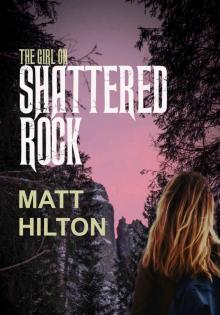 The Girl on Shattered Rock: A gripping suspense thriller
The Girl on Shattered Rock: A gripping suspense thriller Collision Course
Collision Course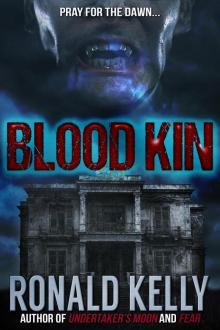 Blood Kin
Blood Kin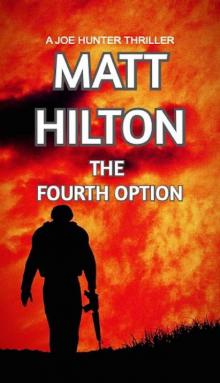 The Fourth Option
The Fourth Option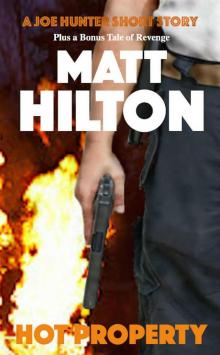 Hot Property: A Joe Hunter Short Story
Hot Property: A Joe Hunter Short Story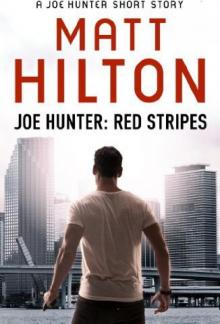 Red Stripes
Red Stripes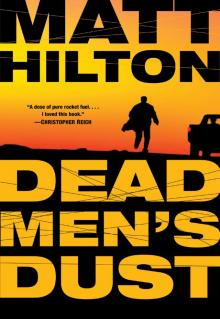 Dead Men's Dust
Dead Men's Dust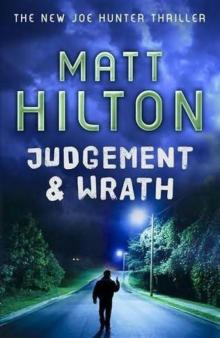 Judgement and Wrath
Judgement and Wrath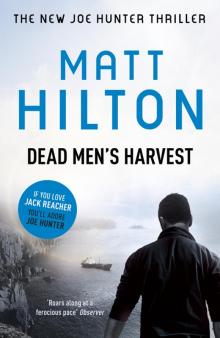 Dead Men's Harvest
Dead Men's Harvest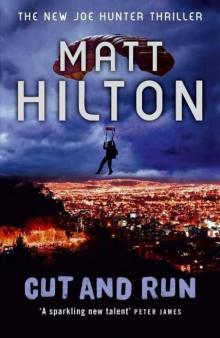 Cut and run jh-4
Cut and run jh-4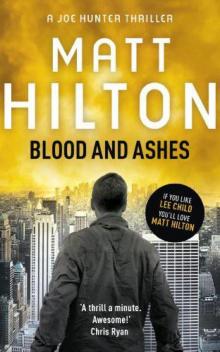 Blood and Ashes jh-5
Blood and Ashes jh-5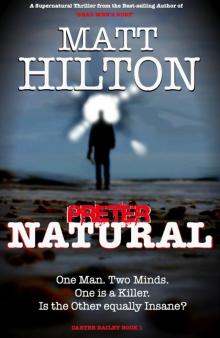 Preternatural: Carter Bailey Book 1
Preternatural: Carter Bailey Book 1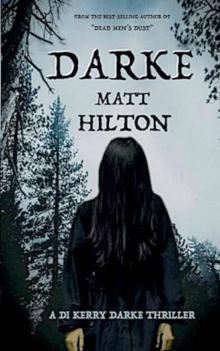 Darke
Darke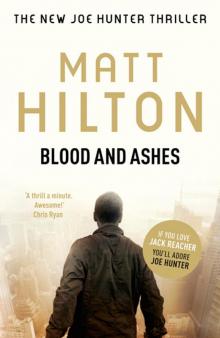 Blood and Ashes
Blood and Ashes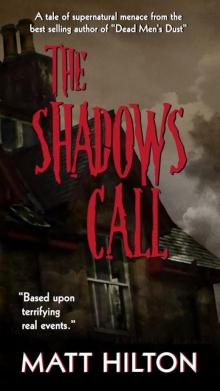 The Shadows Call
The Shadows Call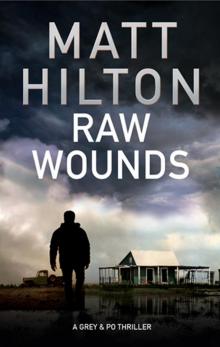 Raw Wounds
Raw Wounds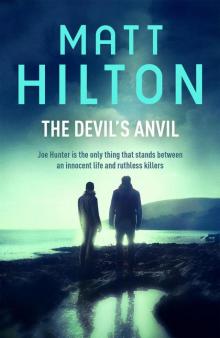 The Devil's Anvil
The Devil's Anvil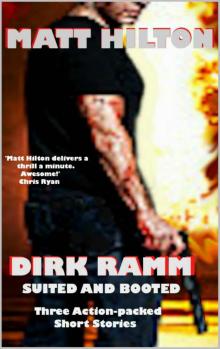 Dirk Ramm: Suited and Booted
Dirk Ramm: Suited and Booted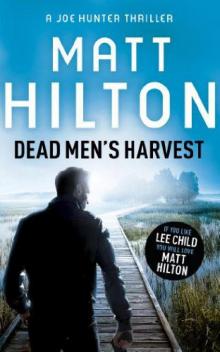 Dead Men's Harvest jh-6
Dead Men's Harvest jh-6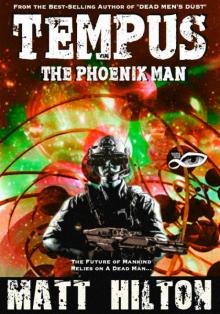 Tempus: The Phoenix Man
Tempus: The Phoenix Man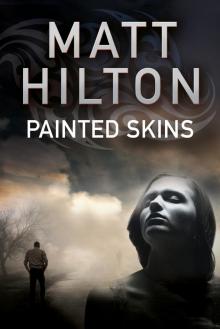 Painted Skins
Painted Skins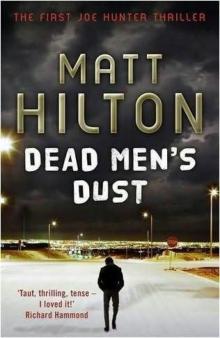 Dead Men's Dust jh-1
Dead Men's Dust jh-1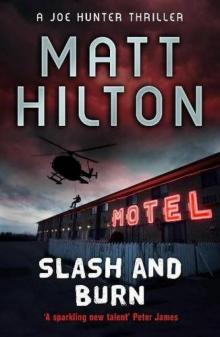 Slash and burn jh-3
Slash and burn jh-3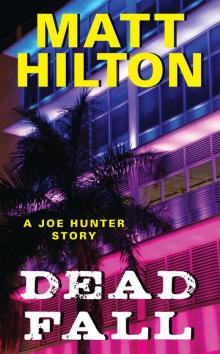 Dead Fall
Dead Fall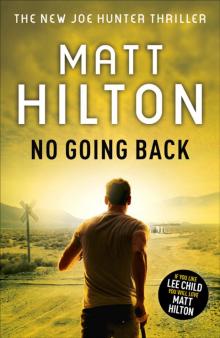 No Going Back - 07
No Going Back - 07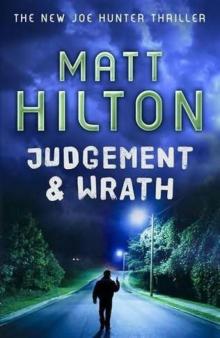 Judgement and Wrath jh-2
Judgement and Wrath jh-2